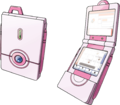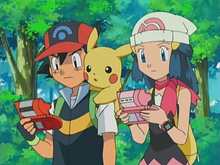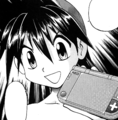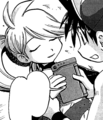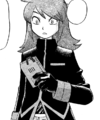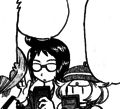Pokédex
- Zukan redirects here. For Japanese figures named after the Pokédex, see Pokémon Zukan figures.
- DEX redirects here. For Pokémon Trading Card Game expansion abbreviated as DEX, see Dark Explorers (TCG).
The Pokédex (Japanese: ポケモン図鑑 illustrated Pokémon encyclopedia) is a digital encyclopedia created by Professor Oak as an invaluable tool to Trainers in the Pokémon world. It gives information about all Pokémon in the world that are contained in its database, although it differs in how it acquires and presents information over the different media. However, they are also only given to a few Trainers at a time, generally to the ones that are felt to have exceptional potential and skill. Regional Pokédexes give information about Pokémon native to its particular region, while the National Pokédex records information about all known Pokémon.
Pokédex entries typically describe a Pokémon in only two or three sentences. They may give background information on the habitat or activities of a Pokémon in the wild or other information on the Pokémon's history or anatomy. Pokédex entries also include height, weight, cry, footprint (prior to Generation VI), location, other forms, and a picture of the Pokémon.
Sometimes the Pokédex might contain inaccurate or mythical information. For example, some of Tentacruel's entries describes it as having 80 tentacles when only 14 are visible.
In the core series
Functions
The Pokédex is a handheld electronic encyclopedia device; one which is capable of recording and retaining information of the various Pokémon of the world. In order to accomplish Professor Oak's goal of a complete Pokémon database, the Pokédex is designed to find and record data on each Pokémon the Trainer meets. Pokémon are added to the Pokédex simply by encountering them in battle or, sometimes, by seeing a picture of the Pokémon. However, detailed entries are not recorded until the player catches the Pokémon, receives it as a prize/gift or acquires it in a trade.
Entries
The main feature of any Pokédex are the entries on each individual Pokémon, which provide details that would otherwise be unexplored in the games. Complete entries can only be seen for captured Pokémon, while uncaptured Pokémon only have limited information.
Generation I
In Generation I's Pokédex (model HANDY505), the entries are simple and each individual section can be accessed directly from the listing. The first, and main option—"Data"—includes an image of the Pokémon, its number, name, category, height, weight, and a short blurb. The second option—"Cry"—does not open a new screen; selecting it simply plays the Pokémon's cry. The last option—"Area"—displays the map, along with flashing indicators at each location where the selected Pokémon can be found; in cases where the Pokémon is not available in the wild, is only available once, or can only be found by fishing or in the Unknown Dungeon, the message "Area Unknown" will be displayed over the center of the map instead. Pokémon Yellow allows players to print entries using the Game Boy Printer.
Generation II
Generation II's Pokédex (model HANDY808) retains the same elements as its predecessor, while adding the Pokémon's footprint to the information and, like Yellow, allows players to print entries. Unlike Generation I, selecting a Pokémon displays the entry in a new screen from which the other sections can be selected. This became the norm for subsequent generations. International versions also have a "Page" button for long Pokédex entries (in Generation I, player simply had to press A button instead); Japanese versions did not have multi-page Pokédex entries.
In these games, entries that would normally display "Area Unknown" on the map simply display an unmarked map.
Generation III
Generation III's Pokédex did not add anything to the main entry; however, Cry was given its own page, which displays the sound wave as it played. In addition, the Area section was changed to highlight locations instead of just marking them and can now display the locations of Pokémon obtainable by fishing. A Size section was added, which displays silhouettes of the Pokémon and the player character side by side. In Pokémon Ruby and Sapphire only, there is a Page button to switch between pages of multi-page Pokédex entries.
FireRed and LeafGreen's Pokédex (model HANDY909) displays entries in a much different format from Ruby, Sapphire and Emerald. It was the first Pokédex to actually display a Pokémon's type in its entry, as well as its menu sprite. However, the Cry visuals were removed. Entries for Kanto Pokémon were taken from Red/Green for FireRed and Red/Blue for LeafGreen. Johto Pokémon entries were taken from Silver for FireRed and Gold for LeafGreen. Additionally, in the international versions, it is the first Pokédex to show long Pokédex entries in full, instead of splitting them into two pages. This was carried over to later games, including Emerald.
Generation IV
Generation IV's Pokédex (model HANDY910) added numerous features, but of FireRed and LeafGreen's changes, it kept only type. Area now changes its highlight color depending on whether a Pokémon is found normally or exclusively using Honey, and the player can view the differences between morning, day and night, with the default being the current time. Cry's display returned, with a bar display in addition to the wave display, and the ability to modify the cry via Chorus/Pan, Reverb/Filter and Loop. Weight was added to the Size section, which puts the Pokémon and the player character on either side of a balance scale. A new Forms section allows players to see gender and form differences within species, but only for forms they have already seen. Males and females of all Pokémon with differing gender are shown separately under in the Forms section even if there is no visible gender difference. For a small list of Pokémon, if the player obtains a Pokémon from another country, they can change the language of that Pokémon's entry after meeting Meister. In Platinum, this function was expanded to all Pokémon, although it still requires Meister to update the Pokédex.
HeartGold and SoulSilver changed the formatting again, now displaying the list on the lower screen and the actual entry on the top screen. Cry's page was again removed. By selecting "view details", players can view Area, Size and Forms. Area no longer defaults to the current time or differentiated for Honey due to it no longer being a mechanic, Size now utilized both screens to display both Height and Weight at the same time, and Forms added a Compare option to see different forms side by side instead of having to scroll between them. Entries for Johto and Kanto Pokémon were taken from Gold for HeartGold and Silver for SoulSilver. Players can collect foreign Pokédex entries without the need to update their Pokédex. Also, while artwork shows a pink Pokédex for females, the in-game interface does not reflect this.
Generation V
The Generation V Pokédex is similar to the Pokédex from Pokémon Diamond, Pearl, and Platinum. It is displayed as a list on the right side of the lower screen with the selected Pokémon's sprite occupying the left side. Most of its functions are also similar to Generation IV's. Instead of showing the time of day that a Pokémon can be caught, as in Generation IV, the Pokédex shows the seasons in which it can be found. Areas in which the Pokémon can be found flash red, and touching an area will show the methods by which it can be caught (walking in tall grass, surfing, or fishing). The height and weight comparison feature has been removed, but a section showing form differences and a search feature are added by Cedric Juniper when the player visits Mistralton City. The form difference section will now show Shiny Pokémon as well as form differences. The last sprite selected will become the one displayed in the main entry. The ability to collect foreign Pokédex entries now only applies to the first 493 Pokémon, but the player can now also collect Korean Pokédex entries. The cry page has been added again as well.
In Black 2 and White 2, after defeating Cheren for the first time, Bianca will upgrade the player's Pokédex with the Habitat List, showing which Pokémon the player has already seen in the selected location, either normally, by finding in the water or via fishing rod (the latter two available later). If all Pokémon available in that place that are available via one of these three ways are seen (such as Purrloin and Patrat for tall grass on Route 19), the reference to the location in such way is marked with a Poké Ball-like stamp; after catching all Pokémon that are found via one of these three ways in current place, it gets marked with a colored Poké Ball-like stamp.
In all four games, extra Pokédex skins can also be downloaded through the Pokémon Global Link. There was a total of seven downloadable skins, but only a maximum of five skins have been made available for each gender of the player:
| Male player | Female player |
|---|---|
| Unova Starters (red) | Unova Starters (pink) |
| Kanto Starters (red) | Kanto Starters (pink) |
| Hugh StyleB2W2 | |
| Bianca Style | |
| Cheren Style | |
Generation VI
The Generation VI Pokédex is card-shaped and has a holographic center that is visible when the two ends are separated. It is also separated into three categories: Central Kalos, Coastal Kalos, and Mountain Kalos, and each category has a different icon in the Pokédex menu. The Coastal Pokédex is represented by a blue stripe on the left side of a pentagon, the Central Pokédex is represented by a white stripe down the middle of a pentagon, and the Mountain Pokédex is represented by a red stripe on the right side of a pentagon. The symbol for the National Pokédex is a Poké Ball.
If the player obtains a Pokémon that was created in Generation VI, the symbol in the Pokédex indicating it has been caught is a combination of the three Kalos Pokédex symbols: a pentagon with vertical blue, white, and red stripes. This resembles the flag of France, the region on which Kalos is based. If a Pokémon is transferred from a previous generation, the symbol will instead be a Poké Ball. The latter symbol can be updated to the former symbol if the player obtains a Pokémon of that species originating from Generation VI. If all Pokémon are obtained from Generation VI games, the Pokédex will be marked with a crown on the selection screen.
In the National Pokédex, there are color codes used to represent Pokémon introduced in each generation: red for Generation I, yellow for II, green for III, blue for IV, pink for V, and silver for VI. Like in Generation V, players may choose the default entry image for each Pokémon species, as long as they have seen that gender, coloration, or form of that species before. Like in previous games, acquiring Pokémon from foreign-language games will unlock the ability to view entries in those languages, so long as the player owns or has owned a Pokémon from that language. This time, all Pokémon entries can be obtained, allowing for both Generation V and VI entries for the first time.
Generation VII
The Generation VII Pokédex consists of a device specially-designed to be inhabited by a Rotom, an innovation that gives the Pokédex its own personality and is intended as a new way for humans and Pokémon to communicate. In addition to a standard Pokédex function, the Rotom Pokédex includes a detailed map that can point out nearby locations of interest, and remind the player of the next objective based on recent conversations with NPCs. The Rotom Pokédex is a rare model even in the Alola region where it was created.
Like the Kalos Pokédex, the Alola Pokédex is divided into several categories, with a section for each of the four main islands of the region. Unlike the Kalos Pokédex, Pokémon in Alola can be found in more than one section of the Pokédex. In addition to the number of Pokémon seen and owned, it also displays the total percentage of Pokédex completion. Event-exclusive forms, regional forms and Mega Evolutions have separate entries from the rest of their species. Unlike previous generations, a Pokémon's gender is only shown separately under the Forms section if there is a visible gender difference. The player can also scan QR codes to add Pokémon they haven't encountered yet to the Pokédex, allowing them to check the Pokémon's location in Alola.
Generation VIII
The Generation VIII Pokédex is an application Sonia installs in the player's Rotom Phone after meeting her for the first time. One a day, the Pokédex application will give the player a reccommended place to look for Pokémon to complete their Galar Regional Pokédex.
Search and order
The original Pokédex had no search function.
In Generation II, the ability to search for Pokémon by type was added, as well as the ability to sort by New Pokédex mode, Old Pokédex mode, A to Z mode and Unown Mode.
In Ruby and Sapphire, the search function was expanded to allow searches by name and color. Players were also given the option to order Pokémon by Heaviest, Lightest, Tallest, or Smallest. Two modes were available, Hoenn and National. National mode was unlocked via a trade with Kanto or Orre, or, in Emerald, defeating the Elite Four.
However, in FireRed and LeafGreen, the search function was dropped altogether, instead choosing to expand the sort functions by adding lists of Pokémon by type and habitat. Heaviest and Tallest orders were also removed. National Mode was unlocked by having obtained 60 Pokémon in the Pokédex, beating the Elite Four and completing the Sevii Island's sidequest.
Generation IV brought the Search function back, as well as Heaviest and Tallest orders. Habitat was dropped. Searches could now be conducted by Form, but not by Color. The two Pokédex modes were Sinnoh and National. National mode was unlocked by seeing every Pokémon in the Sinnoh Dex.
HeartGold and SoulSilver added the ability to search by Height and Weight (instead of simply sorting by them), and also allowed search by Area (Johto, Kanto, or Unknown). National Mode was added by talking with Professor Oak in the S.S. Aqua port in Olivine City after defeating the Elite Four.
In Generation V, the Pokédex for Black, White, Black 2, and White 2 allows the player to search for Pokémon with the following criteria: Order (Number, A to Z, Heavy to Light, Light to Heavy, Tall to Short, and Short to Tall), Name (All letters of the alphabet), Type, Color, which was returned to the search after being dropped in Generation IV, and Form. Unlike in HeartGold and SoulSilver, the ability to search for Pokémon by area was dropped. By changing the Pokédex type, the player can search for Pokémon native to the Unova Region or from other regions, but in order to search for other Pokémon, the player must have first been obtained the National Pokédex upgrade from Cedric Juniper after the defeat of GhetsisBW/IrisB2W2. After obtaining the upgrade, the player can switch the Pokédex type from the National Pokédex to the Unova Pokédex at will by simply tapping "SELECT" in the lower portion of the touch screen or by pressing the SELECT button on the DS System. In Pokémon Black 2 and White 2, it is not possible to use the Search Function in the Habitat List mode of the Pokédex.
In Pokémon X and Y, the ability to search for Pokémon that are not caught was added. Furthermore, only the currently set form of a Pokémon will be considered by the Pokédex when sorting and searching. All other forms will be ignored, and the form setting will not change to make the Pokémon match the search criteria. If the form is changed in the entry and the Pokémon either no longer matches the search criteria or belongs in a different place in the list, its entry will vanish or move according to its new form. The regional Pokédex is divided into three categories, each with separate Pokémon and search functions: Central Kalos (the first one unlocked), Coastal Kalos (unlocked by Sina and Dexio upon entering Route 8), and Mountain Kalos (unlocked by Sina and Dexio in the gate between Coumarine City and Route 13, after beating Ramos). The National Pokédex upgrade is obtained from Dexio after entering the Hall of Fame, upon entering Lumiose Station.
Pokémon Omega Ruby and Alpha Sapphire kept all the search features from X and Y, with some new additions. This time, all forms of a Pokémon registered will be taken in account when sorting and searching, even if they aren't the currently set form. There is also an option to search for Pokémon whose Mega Evolution form or Shiny appearance have been registered.
In Pokémon Sun and Moon, the Pokédex is divided into 4 Island Pokédexes, which feature the Pokémon found in each island of Alola (thus sharing species). Combined, they form the Alola Pokédex, which gathers all the Pokémon present in the Island Pokédexes, plus some others, like Legendary Pokémon and Ultra Beasts. The search/sorting function is only present in the Alola Pokédex proper. In addition to the features available in Omega Ruby and Alpha Sapphire, a new option is present, that allows to search for Pokémon whose Alolan has been seen. There is no National Pokédex mode in these games.
Evaluation
There are various mechanisms to evaluate the number of Pokémon in the Pokédex. These mechanisms will display a quote relating to the number of Pokémon seen or caught, often including a hint to the player of how to progress.
In all games in which Professor Oak appears, he will evaluate the player's Pokédex according to the number of Pokémon they have caught. In games which feature the National Pokédex, Oak's evaluation takes this into account, but in a different way according to the game:
- In Pokémon FireRed and LeafGreen, Oak gives specific quotes according to the number of Pokémon caught in the regional Pokédex, and a general quote according to whether they have completed the National Pokédex or not
- In Pokémon Diamond, Pearl, and Platinum, Oak will only comment on the National Pokédex, according to the number of Pokémon caught
- In Pokémon HeartGold and SoulSilver, Oak will comment on both the regional and National Pokédexes, according to the number of Pokémon caught
In Hoenn-based games, Professor Birch will evaluate the player's Pokédex:
- In Pokémon Ruby and Sapphire, Birch comments on the regional Pokédex, according to the number of Pokémon caught, but only after Wally catches a Ralts. He will also give the number of Pokémon caught in the National dex, after it is obtained
- In Pokémon Emerald, it works the same as Pokémon Ruby and Sapphire, except that Birch will start to evaluate after the player gets the PokéNav
- In Pokémon Omega Ruby and Alpha Sapphire, Birch will comment on the regional Pokédex according to the number of Pokémon seen, and the national Pokédex according to the number caught
In Pokémon Diamond, Pearl, and Platinum, as well as Oak evaluating the National dex as noted above, Professor Rowan will also evaluate the regional dex according to the number seen.
In Pokémon Black and White, Pokémon Black 2, and Pokémon White 2, Professor Juniper will evaluate the regional Pokédex according to both seen and caught Pokémon.
In Pokémon X and Y, Professor Sycamore will evaluate all three regional Pokédexes according to seen Pokémon, and the National Pokédex according to caught Pokémon.
In Pokémon Sun, Moon, Ultra Sun, and Ultra Moon, the Rotom Pokédex itself will evaluate according to the number of Pokémon seen in each of the four islands as well as in Alola as a whole.
Completion
- See also: Diploma
Completing the Pokédex is a common goal of Trainers and carries with it much esteem due to its difficulty, which has gradually escalated due to the fact that around 100 new Pokémon are introduced with each new generation. However, this is mitigated to a degree by new features added to the games, such as Wi-Fi and the Global Trade System in Generation IV, and a less restrictive trading system (between PC boxes instead of only active teams) in Generation V. The exclusion of event Pokémon as a requirement for completing the Pokédex also makes it possible for people with no access to event distributions to complete the Pokédex.
The in-game rewards are usually a congratulations from the director's avatar and a diploma, usually one for completing the regional Pokédex and one for the National Pokédex. In Emerald, the player could choose from one of the Johto starter Pokémon for completing the Hoenn Dex. The completion of the Pokédex also usually allows the player to upgrade their Trainer Card. Also, in Pokémon Black and White, the diploma will appear on the shelf in the player's bedroom.
In Generations I to III, the completion of the regional Pokédex is tracked by how many Pokémon the player has caught. However, in Pokémon Diamond and Pearl and Platinum, the regional Pokédex is tracked simply by how many Pokémon the player has seen. In Pokémon HeartGold and SoulSilver, though, it again registers only Pokémon that have been caught. In Generation V, though Professor Juniper originally evaluates the player's regional Pokédex based on the Pokémon the player has seen, they may still only receive a diploma after having caught all regional Pokémon. Completion of the National Pokédex is always based only on the number of Pokémon caught.
In Pokémon Black and White 2, the system is revised to give the player more in-game recognition of their achievements. Once all the Pokémon in the Unova Pokédex have been seen, Professor Juniper presents the player a Permit, allowing access to the Nature Preserve. Once the player has caught all of the Pokémon in the Unova Pokédex, Professor Juniper will give the player an Oval Charm which increases the chances of finding Pokémon Eggs at the Pokémon Day Care. When the player completes the National Pokédex, Professor Juniper gives the player a Shiny Charm, which increases the chances of encountering and hatching Shiny Pokémon.
In Pokémon X and Y, Professor Sycamore will reward the player with an Oval Charm upon seeing all Pokémon in the Kalos Pokédex, except for Articuno, Zapdos, Moltres, and Mewtwo. Upon completing the National Pokédex, the player will receive a Shiny Charm from Sycamore.
In Pokémon Omega Ruby and Alpha Sapphire, Professor Birch will reward the player with an Oval Charm upon seeing all Pokémon in the Hoenn Pokédex, except for Jirachi. Should the player complete the National Pokédex, Birch will also reward the player with a Shiny Charm. Also in Omega Ruby and Alpha Sapphire, the diplomas given by the director can be displayed in the player's Secret Base and can be viewed in the same way when obtaining it from the director. Other players visiting the secret base cannot see the full image on the diplomas, but instead will view it as an "impressive certificate".
Acquisition
Pokédex
|
Upgrades
- For the National Pokédex upgrade locations, see National Pokédex
|
Gallery
Interface

|
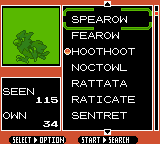
|
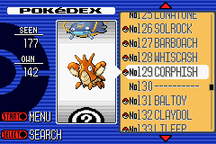
|
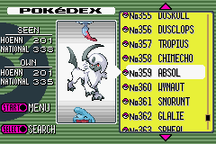
|
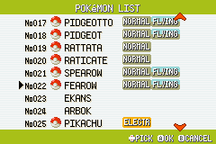
|
|---|---|---|---|---|
| RBY | GSC | RS | E | FRLG |

|
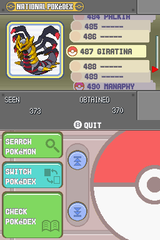
|
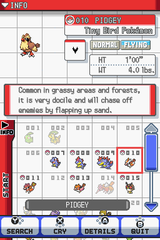
|
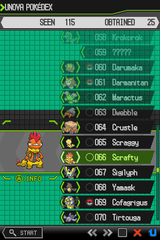
|
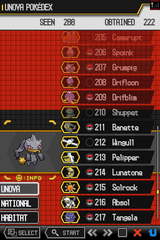
|
| DP | Pt | HGSS | BW | B2W2 |

|
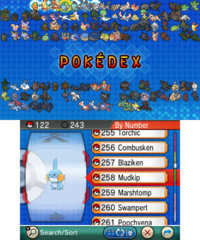
|

|
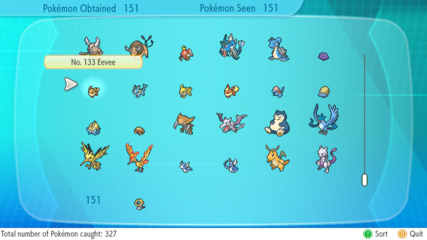
| |
| XY | ORAS | SMUSUM | PE | |
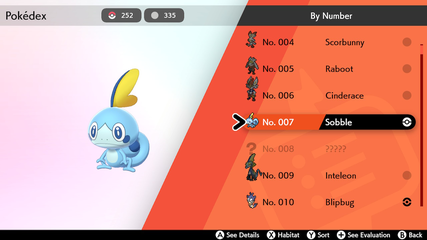
| ||||
| SwSh | ||||
Entry

|

|
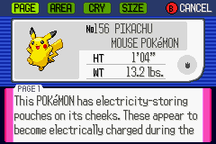
|
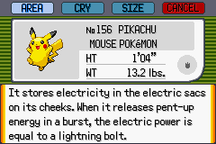
|
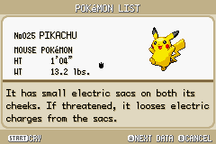
|
|---|---|---|---|---|
| RBY | GSC | RS | E | FRLG |
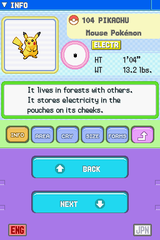
|

|
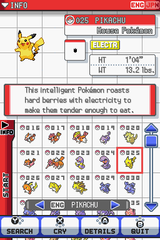
|
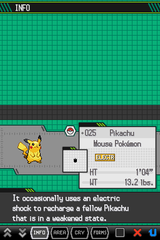
|
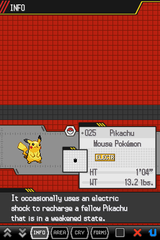
|
| DP | Pt | HGSS | BW | B2W2 |
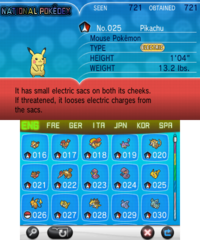
|

|

|

| |
| XY | ORAS | SMUSUM | PE | |
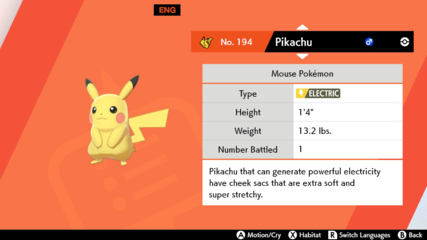
| ||||
| SwSh | ||||
Artwork
The Kanto Pokédex in Pokémon Red and Green
The Kanto Pokédex in Generation I
The Johto Pokédex in Generation II
The Hoenn Pokédex in Generation III
The Sinnoh Pokédex in Pokémon Diamond and Pearl
The Sinnoh Pokédex in Pokémon Platinum
The male Johto Pokédex in Generation IV
The male and female Unova Pokédexes in Generation V
The Kalos Pokédex in Generation VI
The Alola Rotom Pokédex in Generation VII
- LGPE Pokedex.png
The Kanto Pokédex in Generation VII
The Galar Rotom Phone in Generation VIII
In the side games
In the Pokémon Stadium series
In Pokémon Stadium (Japanese), Pokémon Stadium (English), and Pokémon Stadium 2, the Pokédex (Japanese: ずかん Illustrated Encyclopedia) is a 3D visualization of the Pokédex from a core series game connected via Transfer Pak.
Compatibility
Pokémon Stadium (Japanese) and Pokémon Stadium (English) are compatible with all Generation I core series games. Pokémon Stadium 2 is compatible with all Generation I and Generation II core series games. The American and European versions of the Stadium and core series games are compatible with each other, but not with Japanese games. The Japanese versions of the Stadium games and the core series games are compatible with each other. The Korean versions of Pokémon Gold and Silver are not compatible with any Stadium game.
Location
In Pokémon Stadium (Japanese), the Pokédex is found in the menu at the beginning of the game. In Pokémon Stadium (English) and Pokémon Stadium 2, the Pokédex is found at the Pokémon Lab.
In-game requirements
The Pokédex in the Stadium games requires the player to have the Pokédex in the connected core series game. Additionally, the Unowndex in Pokémon Stadium 2 requires the player to have the Unown Mode in the connected Generation II game.
In Pokémon Stadium (Japanese), the Pokédex is only available if the player saved the core series at a Pokémon Center. In Pokémon Stadium (English) and Pokémon Stadium 2, the Pokédex is available even if the player saved elsewhere.
| English | Japanese | Notes |
|---|---|---|
| Data | データをみる See data | See the entry about a Pokémon. This is not visibly shown in Stadium 2, where this is replaced by just pressing A. |
| Cry | なきごえ Cry | Hear the Pokémon's cry |
| Area | ぶんぷをみる See distribution | See a 3D map with the location of wild Pokémon in the games. |
| Zoom | かくだい Magnify | Display the Pokémon 3D model in full screen. This is only available in Stadium 2. |
| Quit | やめる Stop | Close the Pokédex, which is also doable by just pressing B. This is not visibly shown in Stadium 2. |
Available information and 3D models
| English | Japanese | Notes |
|---|---|---|
| Seen | みつけたかず Amount discovered | The number of Pokémon species that the player has seen. |
| Own | つかまえたかず Amount captured | The number of Pokémon species that the player has or had at any point. |
| Caught | もっているかず Amount taken | The number of Pokémon species currently available in the party or the Pokémon Storage System. |
In the three Stadium games, if a Pokémon was not seen, own, or caught, then its respective Pokédex slot is completely empty, except for its Pokédex number. In Pokémon Stadium (Japanese) and Pokémon Stadium (English), the 151 Kanto Pokédex slots are always visible, even if they are empty. In Pokémon Stadium 2, the slots are shown only up to the last available Pokémon according to each ordering system; other empty slots after the last Pokémon are not shown. In Pokémon Stadium (Japanese) and Pokémon Stadium (English), the alphabetical order displays even the empty lines associated with unlisted Pokémon. In Pokémon Stadium 2, the alphabetical order only displays Pokémon whose names are visible (that is, only the seen, own, and caught Pokémon); empty lines are not shown.
In the Pokédex list, a "caught" Pokémon has a red Poké Ball symbol, an "own" Pokémon has a gray Poké Ball symbol and a "seen" Pokémon has no Poké Ball symbol. A partial Pokédex entry is available for "seen" Pokémon, which contains only the 3D model, species, number, category, cry, and wild Pokémon map. The full Pokédex entry is available for a "caught" or "own" Pokémon, which includes all the aforementioned data and also its height, weight, and description. The full 3D model is available for all "own" and "caught" Pokémon, while a transparent and faded out 3D model is available for all "seen" Pokémon. In all three Stadium games, the player may rotate the 3D model of a Pokémon. In Pokémon Stadium 2, there is an additional zoom feature to display the Pokémon in full screen.
Distribution map
In the three Stadium games, there is a 3D distribution map with the location and level of wild Pokémon in the connected core series games. Different sections of the same places are also listed, such as different floors in caves and areas in the Kanto Safari Zone. Pokémon Stadium 2 also displays whether a Pokémon is found by surfing or fishing and the time of day. If Stadium 2 is used to visualize a Generation I game, then the Generation I style from previous Stadium games is used. If Stadium 2 is used to visualize a Generation II game, then an updated Generation II style is used, which includes Mt. Silver visible in both the Kanto and Johto maps.
There's a glitch which causes non-Japanese Stadium 2 connected with non-Japanese Pokémon Blue to display the map locations for Japanese Blue instead. For instance, the Pokédex map in Stadium 2 incorrectly displays Raticate as available in the Cerulean Cave in the non-Japanese versions of Pokémon Blue, when in fact Raticate is only available there in the Japanese version of Pokémon Blue.
Ordering
Pokémon Stadium (Japanese and English)
In Pokémon Stadium (Japanese and English), the player may press the right C button to change the Pokédex order.
| English | Japanese | Notes |
|---|---|---|
| By No. | ばんごうじゅん Numerical order | Organize the Pokémon by the Kanto Pokédex order. |
| A to Z | アイウエオじゅん Kana order | Organize the Pokémon by their names. In English and European versions, this is the alphabetical order. In Japanese, this is the kana syllabary order. |
Pokémon Stadium 2
In Pokémon Stadium 2, the player may press R to open the Option (Japanese: オプション Option) screen, which displays a list of available ordering systems. The New Pokédex order is used by default. However, the National Pokédex number is displayed no matter what is the ordering system used. If Pokémon Stadium 2 is used to display the Pokédex of a Generation I game, then only the options "Old Pokédex" and "A to Z" are available.
| English | Japanese | Notes |
|---|---|---|
| New Pokédex | あたらしいずかん New Pokédex | Organize the Pokémon by the New Pokédex order. |
| Old Pokédex | ふるいずかん Old Pokédex | Organize the Pokémon by the National Pokédex order. |
| A to Z | アイウエオじゅん Kana order | This is the same as the "A to Z" mode in the games above. |
| Unowndex | アンノーンずかん Illustrated Unknown encyclopedia | Displays the list of Unown, like the Unown Mode of the Generation II core series games. |
Search
There is a Search (Japanese: けんさく Search) screen available in Pokémon Stadium 2. In the Pokédex, the player may press L to open the Search screen. The player may choose a type or a combination of two types. The list of search results only displays Pokémon that were "caught" or "own"; it doesn't display Pokémon that were only "seen".
Unowndex
In Pokémon Stadium 2, the Unowndex (Japanese: アンノーンずかん Illustrated Unknown encyclopedia) is a variation of the Unown Mode from the Generation II core series games. Like in the main Pokédex from the Stadium series, there is a number of "Caught" Unown (the number of different Unown forms that the player has or had at any point) and "Own" Unown (the number of different Unown forms currently available in the party or the Pokémon Storage System). However, the Unowndex has no "Seen" feature, so there is no way to check if any Unown forms were seen but never captured. The 26 available Unown forms are displayed in the order that they were caught. If a certain Unown form was never caught, then it does not appear in the list at all. The Unowndex includes a 3D model for each available Unown form and the additional full screen zoom feature that was introduced in Pokémon Stadium 2. The Unown word is also shown, like "Angry" (Unown A), "Bear" (Unown B), etc.
Rental Pokémon
In Pokémon Stadium (English) the rental Pokémon are shown in the Kanto Pokédex order. This is not the case with Pokémon Stadium (Japanese), which lacks rental Pokémon and Pokémon Stadium 2, which displays rental Pokémon in alphabetical order.
Gallery
Interface

|

|

|
|---|---|---|
| Stadium (Japanese) | Stadium (English) | Stadium 2 |
Entries
| Caught Pokémon |
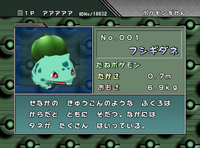
|
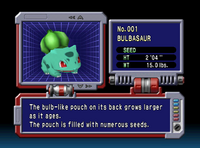
|
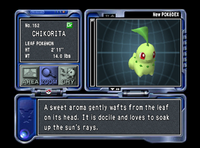
|
|---|---|---|---|
| Stadium (Japanese) | Stadium (English) | Stadium 2 | |
| Seen Pokémon |
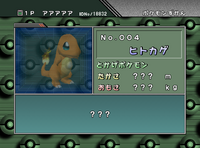
|
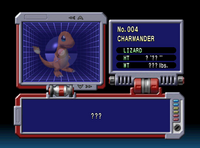
|
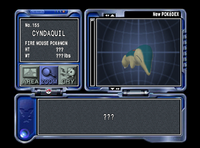
|
| Stadium (Japanese) | Stadium (English) | Stadium 2 |
Additional Stadium 2 features
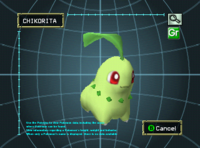
|

|
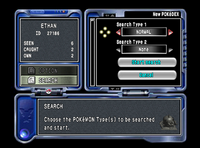
|
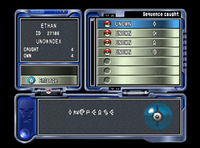
|
|---|---|---|---|
| Zoom | Ordering systems | Search | Unowndex |
Maps

|

|

|

|
|---|---|---|---|
| Kanto map (Generation I) |
Johto map | Kanto map (Generation II) |
Detailed view |
Game Boy-style maps

|

|

|
|---|---|---|
| Kanto map (Generation I) |
Johto map | Kanto map (Generation II) |
In the spin-off games
In the Pokémon Pinball series
The games Pokémon Pinball and Pokémon Pinball: Ruby & Sapphire have a Pokédex option in the menu.
Available Pokémon
In Pokémon Pinball, the 151 Generation I Pokémon are shown in the Kanto Pokédex order.
In Pokémon Pinball: Ruby & Sapphire, there are 205 Pokémon. The first 201 are the Pokémon from the Generation III Hoenn Pokédex, except for Deoxys, which is unavailable from this game. They are shown in the numerical order of that Pokédex. Then there are 4 unnumbered Pokémon not found in the Hoenn Pokédex: Chikorita, Cyndaquil, Totodile, and Aerodactyl. The Pokédex is considered complete if the first 201 Pokémon from the Hoenn Pokédex are captured, which makes the word "complete" appear with a medal.
Pokédex information and images
In both games, the captured and seen Pokémon appear as visible names on the Pokédex list, while other Pokémon are unidentified. Additionally, in Pokémon Pinball: Ruby & Sapphire, there is a Poké Ball icon next to the name of each captured Pokémon. Each full Pokédex entry is only available for a captured Pokémon. Specifically, the Pokédex displays a Pokémon's number, name, height, weight, category and description, together with an image of the Pokémon. If the Pokémon was only seen, then only the name and category are displayed, and there is a black silhouette instead of the complete image. The Pokédex information may be shared between players to some extent, as detailed in the connectivity section below.
In the Pokédex screen, the player may press Start (in Pokémon Pinball) or Select (in Pokémon Pinball: Ruby & Sapphire) to see the Pokémon sprite animation that would appear when a Pokémon is in the process of being captured or hatched. This is unavailable for other Pokémon that are acquired only via evolution or bonus stages and thus don't have an animation like these. This only works if the Pokémon is shown as captured in the Pokédex. In Pokémon Pinball: Ruby & Sapphire, the text "Press Select" appears when this is available for a given Pokémon.
In Pokémon Pinball, the Pokédex entries are taken from Pokémon Red and Blue. In Pokémon Pinball: Ruby & Sapphire, the Pokédex entries for the Generation III Pokémon are taken from Pokémon Ruby and Sapphire. The Pokédex description for Chikorita, Cyndaquil, Totodile, and Aerodactyl is simply "Bonus appearance on Ruby Field."
In Pokémon Pinball, pressing Select at the Pokédex screen displays numbers in the format "x/y" at the top of the screen, where x is the number of captured Pokémon and y is the number of seen Pokémon. (for instance, "015/023" means that there are 15 captured Pokémon, out of 23 seen Pokémon) In Pokémon Pinball: Ruby & Sapphire, the Pokédex just displays the number of captured and seen Pokémon like in the core series without having to press any button. All captured Pokémon also count as seen Pokémon, like in the core series games.
In Pokémon Pinball, the first 150 Pokédex slots (from Bulbasaur to Mewtwo) appear as numbered, empty lines at the beginning; Mew is the next Pokémon, which only appears at the end of the list if it is seen or captured, otherwise its respective line is not shown at all. Similarly, in Pokémon Pinball: Ruby & Sapphire, the first 200 Pokédex slots (from Treecko to Rayquaza) appear as numbered "-------" lines at the beginning. The next Pokémon are Jirachi, Chikorita, Cyndaquil, Totodile, and Aerodactyl. If the player sees or captures any of them, then its line appears and any previous lines above it appear as new "-------" lines if applicable.
Connectivity
In Pokémon Pinball: Ruby & Sapphire, it's possible for two players to share the Pokédex to some extent by connecting their games via the Game Link Cable and then pressing Start at the Pokédex screen. This brings up a confirmation screen to finish this procedure. Once this is done, if either player has a captured Pokémon that the other player does not have, the name, image, and description of that Pokémon become visible to the latter player. However, the image of shared Pokémon is darkened and other information (category, height, weight, and description) is still not shown, indicating that the Pokémon was not captured yet. The category of that Pokémon is shown only if the Pokémon was seen by normal means. This procedure does not affect the number of captured and seen Pokémon of either player. A Pokémon that was just seen (that is, not captured) in normal play or that is visible in the Pokédex just because of Pokédex sharing can't be shared with other players. This procedure works normally between games from different languages.
Capturing and seeing Pokémon
In both games, when the player starts the Catch 'Em Mode, the silhouette of the Pokémon appears; at this point, the Pokémon counts as "seen". If the player successfully captures that Pokémon, it counts as "captured".
In Pokémon Pinball, when the player starts the Evolution Mode and chooses a Pokémon to evolve, the evolved form counts as "seen". (even though the evolved form does not visibly appear until the end of the evolution procedure) In Pokémon Pinball: Ruby & Sapphire, it's not possible to count a Pokémon as "seen" via evolution. In either game, if the player successfully evolves a Pokémon, it counts as "captured".
In Pokémon Pinball: Ruby & Sapphire, when the player hatches an Egg, the baby Pokémon starts moving through the pinball table; at this point, the Pokémon counts as "seen". If the player successfully captures that Pokémon, it counts as "captured".
Deleting Pokédex data
In Pokémon Pinball: Ruby & Sapphire, it is possible to delete the Pokédex data by pressing left while simultaneously pressing L + R three times. This brings up a prompt asking confirmation to delete the data.
Gallery
Pokémon Pinball
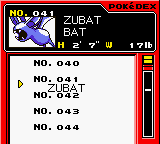
|
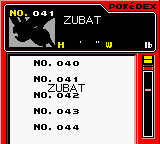
|

|
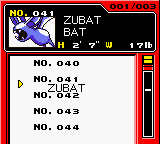
| |
|---|---|---|---|---|
| Captured Pokémon | Seen Pokémon | Capture sprite | Entry | Pokédex numbers enabled* |
Pokémon Pinball: Ruby & Sapphire
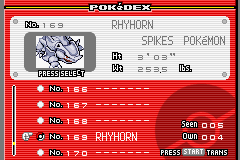
|
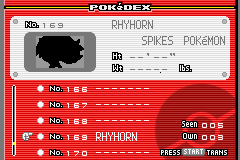
|
|
|---|---|---|
| Captured Pokémon | Seen Pokémon | Capture sprite |

|
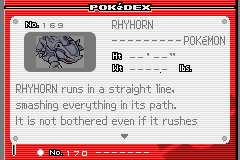
|
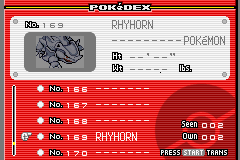
|
| Full entry | Shared Pokémon entry | Shared Pokémon |
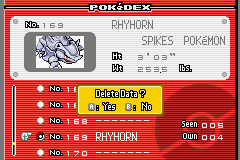
|
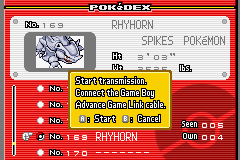
|
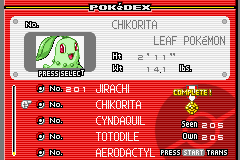
|
| Delete Pokédex data | Share Pokédex data | Complete Pokédex |
In the Pokémon mini series
In Pokémon Tetris, the Pokédex is available in the menu at the beginning of the game. It is a list of the Pokémon that were captured in the Tetris game, and how many of each species was captured. Each captured Pokémon has 3 images: the full detailed image that appears when a Pokémon species is captured for the first time in the Tetris game, the small black silhouette that appears when a Pokémon species is available for capture in the Tetris game but was never captured before, and the small drawing which appears when a previously captured Pokémon species is available to be captured again in the Tetris game. All Pokémon appear as unidentified "----------" lines by default, until they are captured.
There are 249 Pokémon in this game, listed in the National Pokédex order. Almost all Pokémon from Generation I and Generation II are available, except Mew and Celebi, which don't appear in the Pokédex. The slot #151 (Mew) is empty and the cursor can't point to it, while the slot #251 (Celebi) does not appear in the list since the Pokédex ends at the slot #250 (Ho-Oh). A Poké Ball symbol serves as the cursor, which the player can use to point at any listed Pokémon.
Gallery

|
|---|
| Pokédex |
In the Pokémon Ranger series
In Pokémon Ranger, Pokémon Ranger: Shadows of Almia, and Pokémon Ranger: Guardian Signs, there is no Pokédex, but they have regional Browsers that also list Pokémon and give them their own Browser number unique for each region. All Browsers can search for Pokémon by name, Poké Assist, Field Move, the Almia Browser can also search by Browser Number. The Fiore Browser can list Pokémon by Browser Number, letter, weight, and height.
In the Pokémon Trading Card Game series
In Pokémon Trading Card Game and Pokémon Card GB2: Here Comes Team GR!, there is no Pokédex. However, a similar feature is the card album in the PC, which lists cards in order and the quantity of cards owned by the player, not counting repeated cards. In both games, the cards are usually organized by their index number hidden in the internal data, which separates the Pokémon cards by type and then orders them by their National Pokédex number. The National Pokédex number is printed on all Pokémon cards. Additionally, the Pokédex card is available in both games and the Imakuni? card (also found in both games) states that Imakuni? is a creature not listed in the Pokédex.
Gallery
| Pokédex card (GB1) | Pokédex card (GB2) |
|---|
In the anime

In the main series
When a young Sam, who later turned out to be Professor Oak's younger self, was accidentally warped to a future of his own time, Ash explained to him how the Pokédex works, unknowingly giving him an idea. This is an example of a causal loop, meaning the idea for the Pokédex came out of nowhere.
In Pokémon - I Choose You!, Ash received his first Pokédex, apparently nicknamed "Dexter". Throughout the series, Ash uses it to either identify Pokémon he is not familiar with, check a Pokémon's moves, or identify Pokémon on request. Occasionally, though, Ash will scan Pokémon he has already seen, likely to either refresh his memory or out of curiosity.
In Pokémon Emergency, Officer Jenny informed Ash that the Pokédex can be used as an ID card. Since then, Ash has used his Pokédex to register for the various Pokémon Leagues he has participated in. As shown in Mounting a Coordinator Assault!, the Pokédex can also be used by Coordinators registering to obtain a Contest Pass for entering Pokémon Contests.
In Mystery at the Lighthouse, Brock informed Ash that a Pokémon Trainer can use their Pokédex to exchange their Pokémon.
In The Evolution Solution, it was mentioned that the Pokédex entries were written by Professor Westwood V of Seafoam Island. Unlike the games, entries in the anime are pre-programmed into the database and do not require catching to give full information. In this way, they act more as a true encyclopedia than a data-recording device. However, it should be noted that information relayed to the user may vary from time to time. This may happen even if the Pokédex remains unchanged in any way.
To look up information on a particular species, Trainers may simply point the Pokédex at an individual or manually enter it in. The Pokédex will then display a picture and read the entry out loud. The image displayed will be Ken Sugimori's official artwork. In The Legend of Thunder!, however, a stylized art of Raikou was shown when Jimmy looked it up.
In Pokémon the Series: Diamond and Pearl, it was revealed that it can identify the Pokémon's level and learned moves, even for wild Pokémon. Apparently, a picture or video recording of sufficient quality can also be scanned for information.
Attempting to identify an unknown Pokémon, usually one not native to the region the Pokédex was designed for, yields the message "no data". This message may also appear when scanning a Mythical or Legendary Pokémon.
In Kanto, Johto, and Unova, the Pokédex has a male voice; while in Hoenn, Sinnoh, and Kalos, it has a female voice. The upgraded Pokédex Ash and Serena received at the end of All Eyes on the Future! also has a male voice in the Japanese version. The gender of the voice may vary in some international dubs.
Like in the games, the Pokédex has gone through various designs. This includes its shape and way of opening, display, as well as the aforementioned voice. The Unova Pokédex redesign in the anime is significant, as it shows all the viewing angles from the Pokémon, with the exception of the back.
Trainers without the luxury of a Pokédex may have access to other means of finding information. Some use high-tech computers, like Giovanni in The Thief That Keeps On Thieving! or Shingo in Wired for Battle!. In several episodes, James used a deck of cards, which slightly resemble TCG cards. The deck of cards was replaced with a hologram laptop in Pokémon the Series: XY, and with a book in Pokémon the Series: Sun & Moon.
Pokédex entries
|
|
Gallery
Ash's original Pokédex
Ash's second Kanto Pokédex, failing to scan Gary's Electivire
Ash's Sinnoh Pokédex scanning Dawn's Piplup
Dawn's Sinnoh Pokédex
- Mamie Lavender Pokedex.png
Mamie's Pokédex
The Unova Pokédex
Ash scanning Dedenne on his Kalos Pokédex
The Rotom Pokédex in Alola
Ash's Rotom Phone
Goh's Rotom Phone
Scanning Nickit on the Rotom Phone
Team Rocket's Rotom Phone
Team Rocket's Rotom Phone scanning Drednaw
- Karabari Rotom Phone.png
Karabari's Rotom Phone
Voice actors
| ||||||||||||||||||||||||||||||||||||||||||||||||||
In Pokémon Origins

The Kanto Pokédex appeared during the Pokémon Origins miniseries, where they served the same purpose as in the original Pokémon Red and Blue games. They recorded basic info of any Pokémon encountered, and detailed info of any Pokémon caught. Much like in the games, one was given to both Red and Blue by Professor Oak. By the end of the last episode of the miniseries, Red had managed to capture all 150 Generation I Pokémon, excluding only Mew. Blue's Pokédex was later crushed when his Blastoise accidentally crashed onto it while he was battling Mewtwo in the Cerulean Cave.
Besides listing all the caught Pokémon in numerical order, the Pokédex was also able to sort the recorded Pokémon data by other factors, such as the type, as seen when Professor Oak tried to identify the Pokémon Blue had fought by going through the list of Psychic-type Pokémon in Red's Pokédex.
In the manga
In the Be the Best! Pokémon B+W manga
A Pokédex appeared in Pokédex Complete!.
In The Electric Tale of Pikachu manga
In The Electric Tale of Pikachu, Pokémon Trainers receive their Pokédexes when their application to become a Pokémon Trainer is accepted. A Pokédex contains information on a Pokémon's moves and abilities, as well as general information (such as how some Pokémon, like Pikachu, dislike Poké Balls) and the ability to tell if a Pokémon has critically low HP. In addition, all Pokédexes contain a copy of the Trainer's license.
Updated versions of the Pokédex are released from time to time: in Clefairy Tale, Professor Oak gave Ash a beta version of the latest model of the Pokédex.
In the Pocket Monsters BW Good Partners manga
A Pokédex appeared in BWGP02.
In the Pokémon Adventures manga

In Pokémon Adventures, only a select group of people have Pokédexes and they are highly respected as a result. The Pokédexes come in groups of three per region, and are generally given out along with a starter Pokémon from the region's Professor. The only exceptions to this rule are the second set of Unova Pokédexes and the Alola Pokédexes, both of which only have two. Each Pokédex has a holder registration system, meaning when it is assigned, the holder must register his or her name and fingerprints, which means each of the Pokédexes is only allowed to have one rightful owner. However, it is possible to transfer data from one Pokédex to an upgraded version, leaving the Pokédex that had its data transferred with no rightful owner, and thus, the Pokédex would be able to be reassigned to a new owner. It is shown that when the three Pokédexes from the same region are put together, a Pokédex will make a beeping sound as a signal to indicate that another Pokédex is nearby. This only works when held by their rightful owner, as seen in Gimme Shellder. This signal seems to apply for all models of the Pokédex, and the Sinnoh Pokédex holder trio refers to it as the "morning sound" (Japanese: 朝の音), due to it being used to wake the trio up every morning while they were together.
Much as in the anime, the Pokédex in Pokémon Adventures displays the known moves of an individual Pokémon, as well as its current health, its cry, its current moves, and can even track them. Unlike in the anime, the Pokédex entries are usually taken directly from the games and as such contains readable text rather than having the information spoken out loud. The Pikachu interaction feature from Pokémon Yellow was added to Red's Pokédex, allowing him to see its mood (though he never is seen making much use of it, as Yellow was in possession of his Pokédex for most of the Yellow arc, and could tell Pika's mood on her own anyway). The Pokédex's function takes over much of the control the games give to the player, being able to prevent a Pokémon's evolution, whereas Trainers without a Pokédex have no choice in the matter. As seen in Wanted: Pikachu!, the Pokédex can discover where a Pokémon was first met by its Trainer, much as the feature added in Pokémon Crystal allows one to view a Pokémon's origin. In addition to these functions, the Pokédex is able to record and project hologram images and can serve as a portable transporter with the assistance of a Pokégear and Mobile Adapter cable.
In the FireRed & LeafGreen arc, Professor Oak asks Red, Blue, and Green to return their Pokédexes to him, so that he could upgrade them to National Dex. Though in the process, they get stolen by Orm and used by Carr to create a "black Pokédex" (Japanese: 黒い図鑑). Later in the story, the new Pokédexes are received by the trio, and Red's old one is given to Yellow, while Blue and Green's old Pokédexes are destroyed by Deoxys. In the HeartGold & SoulSilver arc, the Johto Pokédex holders get new Pokédexes as well, though it is unknown what happened to their original Pokédexes. In the Omega Ruby & Alpha Sapphire arc, the Hoenn Pokédex holders get new Pokédexes as well, though it is unknown what happened to their original Pokédexes. In addition, the Pokédex formerly held by Cheren was later given back to Cedric Juniper, and eventually destroyed. The third Kalos Pokédex was found by Malva along with Fennekin, but it was destroyed after she deemed it worthless.
There are currently 23 Pokédexes in operation, four Pokédexes destroyed, and six Pokédexes that have their statuses unknown, coming in eleven models based on region and mode. In addition, there is Team Rocket's black Pokédex, which is also currently missing.
While most of the holders have red Pokédexes, the Pokédex can also come in a variety of colors. Crystal, White, and Whitley have pink Pokédexes, while Diamond and Pearl carry a blue Pokédex and an orange Pokédex, respectively.
Gallery
Red's Pokédex
Blue's Pokédex
Green's Pokédex
Yellow's Pokédex, formerly Red's
Gold's orange-red Pokédex
Silver's orange-red Pokédex
Crystal's pink-white Pokédex
Ruby's first Pokédex
Sapphire's first Pokédex
Emerald's first Pokédex
Wally's Pokédex, officially Emerald's
Black's Pokédex
White's pink Pokédex, formerly Bianca's
X's Pokédex
- Y Pokedex Adventures.png
Y's Pokédex
Sun's Pokédex
- Rotom Pokedex Adventures.png
- Soudo Shirudomiria Rotom Phone.png
Shirudomiria (left) and Sōdo's (right) Rotom Phones
Team Rocket's black Pokédex
In the Pokémon Diamond and Pearl manga
The Pokédex appeared in Pokémon Diamond and Pearl.
In the Pokémon Pocket Monsters manga
In the Pokémon Pocket Monsters manga series, the Pokédex is given the same way as in the Generation I games, by Professor Oak. In contrast to the Pokédex in other canons, the ones in this manga uses an antenna.
In the TCG
This listing is of cards mentioning or featuring the Pokédex in the Pokémon Trading Card Game. The Hoenn region's model did not receive a TCG card, and the Generation I and Generation II Pokédexes, which featured model numbers on the Japanese cards (HANDY505 and HANDY808 respectively), did not show these model numbers on the English card. The Generation V Pokédex has no model number even in the Japanese card; it also has the same effect and English name as the Generation I Pokédex. Every card has allowed the player to look at a certain number of cards from the top of their deck and then either arrange them as they like, or in the case of Pokédex HANDY910is, choose one to put in their hand.
| Related cards Cards listed with a blue background are only legal to use in the current Expanded format. Cards listed with a green background are legal to use in both the current Standard and Expanded formats. | |||||||
|---|---|---|---|---|---|---|---|
| Card | Type | English Expansion |
Rarity | # | Japanese Expansion |
Rarity | # |
| Pokédex | I | Base Set | 87/102 | Expansion Pack | |||
| Base Set 2 | 115/130 | ||||||
| Nivi City Gym | |||||||
| Guren Town Gym | |||||||
| Black & White | 98/114 | Beginning Set | 036/037 | ||||
| BW-P Promotional cards | 023/BW-P | ||||||
| New Pokédex | T | Neo Genesis | 95/111 | Gold, Silver, to a New World... | |||
| Pokémon Web | 016/048 | ||||||
| PokéDex HANDY909 | T | EX FireRed & LeafGreen | 96/112 | Flight of Legends | 077/082 | ||
| Pokédex HANDY910is | T | Diamond & Pearl | 111/130 | Space-Time Creation | |||
| Torterra Half Deck | |||||||
| Infernape Half Deck | |||||||
| Empoleon Half Deck | |||||||
| Raichu Half Deck | |||||||
| Bastiodon the Defender | |||||||
| Rampardos the Attacker | |||||||
| Platinum | 114/127 | Dialga Half Deck | 011/013 | ||||
| Giratina Half Deck | 012/013 | ||||||
| Palkia Half Deck | 012/013 | ||||||
| Garchomp Half Deck | 012/016 | ||||||
| Charizard Half Deck | 012/016 | ||||||
Trivia
- Professor Oak has written senryū about the Pokédex in two of his lectures:
- For Two Degrees of Separation!, the Professor Oak's Big Pokémon Encyclopedia featured this senryū: 「こまったら ひらいてみよう ポケモンずかん」 "When troubled, let's open the Pokédex."
- For A Sandile Gusher of Change!, the Professor Oak's Pokémon Live Caster featured this senryū: 「こまったら けんさくいっぱつ ポケモンずかん」 "If you are stuck, one search of the Pokédex is all you need."
- Many Pokédexes appear similar to Nintendo consoles, and other popular electronics.
- The Generation III Kanto Pokédex resembles a Game Boy Advance SP, while the Generation VII Kanto Pokédex resembles a 2-in-1 PC.
- The Generation II Johto Pokédex resembles a Game Boy Color, whilst the Generation IV Johto Pokédex is in similar appearance to a Nintendo DSi.
- Both versions of the Hoenn Pokédex resemble a Game Boy Advance.
- The Sinnoh Pokédex resembles a Nintendo DS Lite.
- The Unova Pokédex resembles an iPod Nano.
- The Alola Rotom Pokédex resembles a Tablet computer.
- The Galar Rotom Phone resembles a smartphone.
- In most canons, the Pokédex is evidently encased in material that is invulnerable to almost anything within reason. It has been soaked in water and (in the anime) electrified and exposed to high-temperature flames, all with no ill effect. It is also voice-sensitive. There are some limitations to its ability; certain circumstances can prevent the Pokédex from accurately identifying its target:
- A Pokédex which has not received a National Mode upgrade will not display any information on Pokémon not usually found in its home region, even if those Pokémon have been caught, and if captured, its number will be listed as "???" (or not listed at all in the case of Sun and Moon) in the summary screen.
- Similarly, Gary's Pokédex failed to identify Mewtwo at the Viridian Gym, displaying only static interference.
- All of Ash's Pokédexes have been red, as are all of the Pokédexes for male player characters in the games, while other characters have had other colors. May had a yellow one in Kanto, Paul has a dark blue Pokédex, Dawn has a pink Pokédex, Rhyanna has an ice blue Pokédex, Narissa has an orange Pokédex, and Mamie has a lavender Pokédex.
- The only Pokédex Ash has never owned is the Pokédex introduced in HeartGold and SoulSilver, but such has been owned by Lyra and Khoury.
- The Kanto regional Pokédex (Generations I and III) and the Sinnoh regional Pokédex (Diamond and Pearl) have 151 members, the smallest of all regional Pokédexes. The largest regional Pokédex is the Kalos regional Pokédex, with 454 members.
- The Pokédex models of Generations I and II rounded the weights of all Pokémon to full pounds except for Gastly and Haunter, despite the Japanese games' use of tenths of kilograms since the start. From Generation III onward, all weights have been given to the nearest tenth of a pound.
- The Pokédex has usually lost several buttons with every new model, due to various upgrades: Kanto's first model has twenty-two buttons; Kanto's third model has nine; Johto's original model has five; Kanto's second model, both of Hoenn's models, and Sinnoh's only have three; and Johto's second model, both of Unova's models, the Kalos model, and the Alola model all apparently have no buttons whatsoever, solely using the touch-screen interface.
- Numerous toy Pokédexes have been manufactured by companies like Tiger Electronics and Jakks Pacific.
- In HeartGold and SoulSilver, the Pokégear's map displays the hat of Ethan's icon in its updated Generation IV design; however, the Pokédex map displays the icon's hat in its Generation II design.
- The Pokédex entries in Pokémon Black and White Versions for Pokémon not native to Unova are the same as those from Pokémon Platinum Version.
In other languages
| |||||||||||||||||||||||||||||||||||||||||||||||||||||||||||||||||||||||||
| |||||||

|
This item article is part of Project ItemDex, a Bulbapedia project that aims to write comprehensive articles on all items. |












